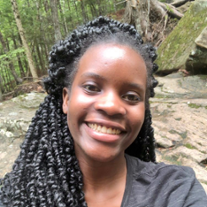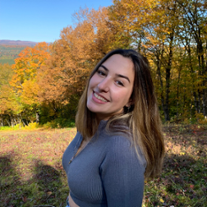How to Become a WWF Living Planet Leader
Author: WWF Living Planet Leaders
Posted on Mar 24, 2022
Category: Opinion , Programs and Updates
Living Planet Leader (LPL) is a self-guided certification that will enhance your resume as well as recognize your sustainable efforts while at university. To earn this title, you must complete a set of actions in four categories outlined by the WWF. Each category is listed below, along with a brief description of how our current LPLs achieved them.
Campus, Community or Global Volunteerism
To complete this category, students must volunteer 40 hours of their time towards an environmental, conservation or sustainability initiative.
 “I believe the Campus, Community or Global Volunteerism was the most rewarding and impactful category. This category requires you to volunteer for 40 hours related to sustainability. Therefore, I completed 10 hours of picking up garbage on the Northwest Trail in Moncton and I was a GreenUNB Representative during my whole second year at UNB. The garbage trail-clean ups allowed me to truly see how my work had an impact, since I bike and run on that trail almost every day when I am home. Being a GreenUNB Representative allowed me to understand that I can make a positive impact on students’ lives by educating them about sustainability, and hopefully this helps them adopt more sustainable practices in their everyday lives.”
“I believe the Campus, Community or Global Volunteerism was the most rewarding and impactful category. This category requires you to volunteer for 40 hours related to sustainability. Therefore, I completed 10 hours of picking up garbage on the Northwest Trail in Moncton and I was a GreenUNB Representative during my whole second year at UNB. The garbage trail-clean ups allowed me to truly see how my work had an impact, since I bike and run on that trail almost every day when I am home. Being a GreenUNB Representative allowed me to understand that I can make a positive impact on students’ lives by educating them about sustainability, and hopefully this helps them adopt more sustainable practices in their everyday lives.”
Anna Lee LeBlanc,
BSc Kinesiology
Personal Application of Sustainability
To complete this category, students must select 40 actions from the WWF Personal Application of Sustainability checklist and write a brief self-reflection on their experience completing them.
 “I found that completing this category was by the far the most tedious but also the most insightful. The WWF checklist of sustainable actions includes several actions that students could easily incorporate in their daily lives to lead an eco-friendly lifestyle. Especially since they are budget friendly. You can also add actions that are missing from the list. Some of my favourite actions from the list were eating less meat, donating gently used items as well as expanding my knowledge by attending events that focus on the environment or sustainability. While sharing my reflection on each action, I recognized the impact I have on a personal, community and environmental level.”
“I found that completing this category was by the far the most tedious but also the most insightful. The WWF checklist of sustainable actions includes several actions that students could easily incorporate in their daily lives to lead an eco-friendly lifestyle. Especially since they are budget friendly. You can also add actions that are missing from the list. Some of my favourite actions from the list were eating less meat, donating gently used items as well as expanding my knowledge by attending events that focus on the environment or sustainability. While sharing my reflection on each action, I recognized the impact I have on a personal, community and environmental level.”
Jacqueline Nsubuga,
BSc Environment & Natural Resources
Application of Sustainability in Academics
Students are to complete a course in conservation or sustainability or can find or create an opportunity to introduce sustainability to an aspect of existing courses or program activities.
 “I was able to achieve the WWF living planet leader academic application through joining extracurricular societies on campus that showcase and promote sustainability. Particularly, one club is the Engineering Undergraduate Society where I acted as a sustainability director. Through this I was able to focus on sustainability in industry by running workshops for students with appearances from industry professionals. My co-director and I also helped in promoting sustainability in Headhall by putting up posters through the main hallways with interesting sustainability facts relating to engineering. I also participated on the Organizing Committee of the Canadian Engineering Competition as a re-engineering competition director. Through this I was able to build cases for competitors to focus on re-engineering waste to create a useable fuel source.”
“I was able to achieve the WWF living planet leader academic application through joining extracurricular societies on campus that showcase and promote sustainability. Particularly, one club is the Engineering Undergraduate Society where I acted as a sustainability director. Through this I was able to focus on sustainability in industry by running workshops for students with appearances from industry professionals. My co-director and I also helped in promoting sustainability in Headhall by putting up posters through the main hallways with interesting sustainability facts relating to engineering. I also participated on the Organizing Committee of the Canadian Engineering Competition as a re-engineering competition director. Through this I was able to build cases for competitors to focus on re-engineering waste to create a useable fuel source.”
Grace Flemming,
BSc Chemical Engineering
Leadership and Teamwork
To complete the category requirements, students must submit at least one example of practicing leadership and teamwork.
 “Throughout my time at university, I have organized and participated in several events focusing on topics related to the environment or sustainability. As the current Renaissance College green representative, I have planned sustainability-based events to help raise awareness. Along with some guidance from the sustainability office, I managed to host green certified events. For example, I helped organize a lights-out coffee house for students as well as a community clean-up in Fredericton. Although not that many people came to the cleanup, I am especially proud of the volunteers who showed up that morning with excitement and dedication, they were determined to clean-up everything they saw. More recently, I utilized the Student Sustainability Fund to help establish a hydroponic system for the RC.
“Throughout my time at university, I have organized and participated in several events focusing on topics related to the environment or sustainability. As the current Renaissance College green representative, I have planned sustainability-based events to help raise awareness. Along with some guidance from the sustainability office, I managed to host green certified events. For example, I helped organize a lights-out coffee house for students as well as a community clean-up in Fredericton. Although not that many people came to the cleanup, I am especially proud of the volunteers who showed up that morning with excitement and dedication, they were determined to clean-up everything they saw. More recently, I utilized the Student Sustainability Fund to help establish a hydroponic system for the RC.
I have gained multiple skills from these experiences, such as networking within my university. There are many resources that are available to us as students, however, they are oftentimes not obvious.”
Rose Myatt,
BPhil Interdisciplinary Leadership & Wildlife Conservation